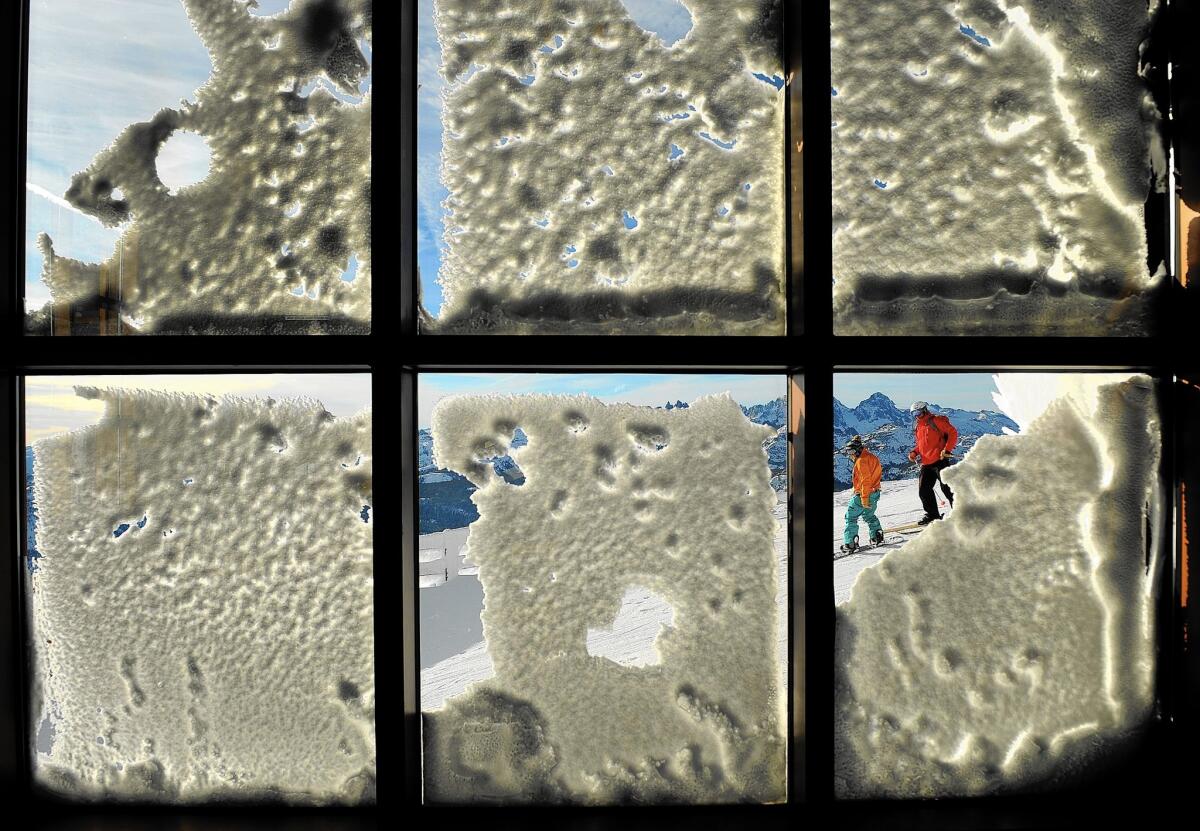Short-term rentals stir opposition in Mammoth Lakes

- Share via
reporting from MAMMOTH LAKES, Calif. — The house Eric Wang bought in 1991 was everything he was looking for in this ski resort town: a safe, quiet retirement haven in a neighborhood that is zoned for single-family homes.
Then eight years ago, a neighbor started renting his house to people who would “roll in late at night on Thursdays and Fridays, then unwind with drinks and dips in the hot tub,” Wang said.
“Nightly rentals are illegal in my neighborhood,” said Wang, 65. “So I complained, and city compliance officers wrote the homeowner a letter.”
But the house is still being rented to visitors, he said, as are many other residences in the Eastern Sierra community. Airbnb and other short-term rental websites are providing lucrative income streams for homeowners.
Nightly rentals have stirred opposition in cities across the country, but the dispute is especially acute in this town of 8,000 people. Mammoth Lakes is isolated, with an economy based almost entirely on tourism, factors that have created crosscurrents unlike those found in larger, more economically diverse regions.
The economy here has been in the doldrums because of drought. Nightly rentals have helped attract tourists and tax revenue by offering visitors a menu of alternatives to traditional hotel and motel lodging.
Yet residents, including many working in the tourism industry, rebelled strongly against the practice and forced the issue to a vote. Fearing that town council members were going to expand nightly rentals into residential zones, 70% of voters approved a measure barring the council from acting on the issue.
“We became perhaps the first resort in California to take the power to transform family neighborhoods into commercial rental zones away from City Hall and put it in the hands of the voters,” said Lisa Isaacs, a resident and environmental activist.
Homeowners oppose the rentals because they want to protect the quality of life in their neighborhoods, which were zoned in the 1980s as buffers against vacation crowds. Many renters joined the majority because nightly rentals would reduce the stock of housing available for conventional, long-term leases.
The opportunity for nightly rentals is vast. When ski conditions are good, the weekend population can soar to 35,000, and some civic boosters believe it could accommodate twice that number. Many residences are vacant most of the year because they are second homes.
“I own a home across the street from my house, which I rent monthly,” said Paul Rudder, a commercial landlord. “I could make four times as much money on it by renting nightly. But that would be illegal.”
Nightly rentals are permitted in Mammoth Lakes’ mixed commercial-residential zone, which covers roughly half the town’s four square miles. That zone includes hotels, motels and residential neighborhoods that are home to the only nine residences in town currently licensed to rent nightly.
Most short-term rentals occur illegally, either because they are in residential zones or are in the mixed-use zone but are not licensed.
Opponents turned to the ballot box after the five-member Town Council signaled that it would address the issue of nightly rentals. “We simply wanted to put to rest an issue that has been controversial in Mammoth Lakes for many years,” said Councilwoman Jo Bacon.
The council also said it wanted to devise better ways to enforce zoning laws as part of an effort to crack down on homeowners who provide short-term rentals without licenses.
But many residents grew suspicious of the council’s intentions, believing the officials wanted to expand night rentals across the community.
“That didn’t make sense to many of us because occupancy rates in existing traditional rentals – condos, hotels and homes — are low,” said Kathy Cage, a local resident and former Town Council member. “We came to believe the Town Council was yielding to special interests that didn’t care about the overall health of the community.”
Allison Page, a real estate agent who opposed Measure Z, said critics miss the point.
“Those who voted for Measure Z simply didn’t want a party next door to their house,” Page said, shaking her head in exasperation.
In her view, Measure Z sends a bad message to visitors who prefer residential accommodations to hotels and motels. “As a result, we’re losing money,” Page said.
Despite voter sentiment, the battle is far from over because, as Wang discovered, the owners of nightly rentals often scoff at the laws. Town officials said enforcing those laws is costly and prosecuting violators is difficult.
“The problem isn’t going to go away,” Councilman John Wentworth said. “It’s driven by billion-dollar companies with very sophisticated online technology that have their crosshairs on communities like ours.
“It would be great if online home-sharing companies like Airbnb would give us access to their databanks so that we could see exactly where people are renting illegally,” Wentworth continued. “But we can’t get them to even return our phone calls.”
A spokeswoman for Airbnb, which lists 1.2 million vacation rental properties worldwide, declined to comment on the Mammoth Lakes vote.
ALSO
Gov. Brown still struggling for GOP support on funding for road repairs
Why some homeowners are no longer cool with backyard pools
Lamar Odom improves: He is talking, texting, ‘doing good’
More to Read
Sign up for Essential California
The most important California stories and recommendations in your inbox every morning.
You may occasionally receive promotional content from the Los Angeles Times.











